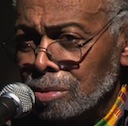
A Turbulent Life: On Amiri Baraka
In 2002, Scott Sherman published this essay on Amiri Baraka. “Yet Baraka still has the power to surprise us.”


In 2002, Scott Sherman published this essay on Amiri Baraka. “Yet Baraka still has the power to surprise us.”

What started as a philosophy promulgated by black elites to “uplift the race” by correcting the “bad” traits of the black poor has evolved into one of the hallmarks of black politics in the age of Obama. In an era marked by rising inequality and declining economic mobility for most Americans—but particularly for black Americans—the politics of respectability works to accommodate neoliberalism.

I’m going to focus on a distinctive landscape of ruins, an amazing, dreadful landscape that came to define the South Bronx, and for many people to define New York, for the last decades of the twentieth century. Those ruins were one of New York’s great negatives. I want to try to do what Hegel says: look the negative in the face.

The purpose of this new magazine is suggested by its name. . . . The accent of Dissent will be radical. Its tradition will be the tradition of democratic socialism. We shall try to reassert the libertarian values of the …

From the beginning, Dissent has been a haven for utopian ideas. An early essay by Irving Howe and Lewis Coser declared that socialism was “the name of our desire,” paraphrasing what Tolstoy had written about God. In 1954 it was …

When you’re celebrating your sixtieth birthday, there is a natural impulse to gaze back fondly at what you did well. For a magazine that has always been described as “little,” Dissent has aspired to contain multitudes. In our pages (and, …

Blacks In and Out of the Left by Michael C. Dawson Harvard University Press, 2013, 256 pp. Contemporary African-American scholars across the humanities and social sciences share a preoccupation with posing big questions about the dilemmas of black life in …

Caring for America: Home Health Workers in the Shadow of the Welfare State By Eileen Boris and Jennifer Klein Oxford, 2012, 320 pp. Caring for America—part feminist critique of the welfare state, part labor history, part organizing case study—is the …

Upon being elected mayor of New York City with nearly 75 percent of the vote, Bill de Blasio began his victory speech with words to gladden the heart of just about anyone who has ever written for Dissent: “Tackling inequality …

Front Porch Politics: The Forgotten Heyday of American Activism in the 1970s and 1980s by Michael Stewart Foley Hill and Wang, 2013, 432 pp. Are the 1970s and 1980s really history? Over the past ten years, the era has undergone …

Marshall was a good friend over many years—almost half a century; he was a political comrade for all those years; and he was a lovely human being. My wife, Judy, and I knew him first as a very vulnerable young …

If the twentieth century was the age of fear, the twenty-first is the age of shame. This is the most succinct way to describe how the dominant form of repression has changed. The twentieth cen-tury was full of terrible events …

Do you remember the proverbial “herd of independent minds”? That was critic Harold Rosenberg’s description, decades ago, of the New York intellectuals. These days some packs are still (alas!) on the left, some on the right, and some run somewhere …

If tomorrow the GOP agreed to everything in the agenda that Barack Obama laid out in his February State of the Union address, the progress in dealing with the dramatic changes in the economic prospects of most Americans would be close to zero.

Ravel Gonçalves Mendonça is a 17-year-old beach volleyball phenom from Rio. He is currently training with Brazil’s national team at its state-of-the-art facility. But his country’s preparation for the Olympics has eliminated what used to be Ravel’s home.